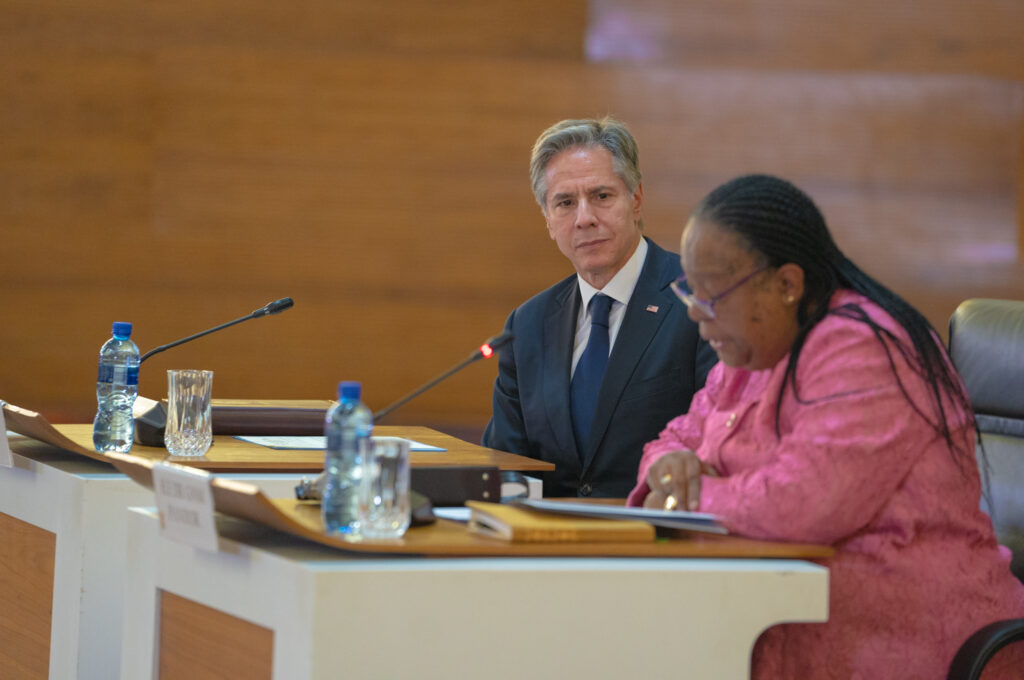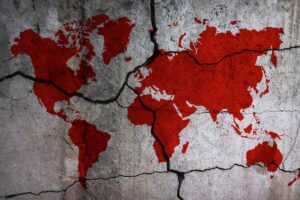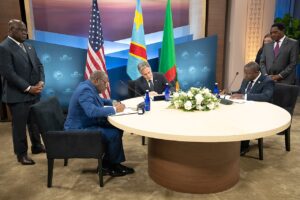What is the opportunity?
The United States has failed to realize the strategic importance of what scholars and politicians used to call the “third world” ― as if the planet’s most populous countries constitute merely the international order’s antechamber. Consequently, U.S. foreign policy toward the Global South has proven to be shortsighted. Washington has repeatedly missed opportunities to develop long-lasting and consistent win-win cooperation that could durably address the root causes of conflict and instability and spur sustainable development and prosperity. Indeed, while Global South states seek to develop through cooperation with bigger powers such as the United States, Washington also benefits from and often on partnerships with the Global South.
- In the economic and trade sectors, the United States relies on minerals, textiles and clothing, and vegetables and other food product imports from countries such as Brazil, Mexico, Singapore, South Africa, Peru, and Vietnam.
- In the diplomatic sector, Washington often seeks to build coalitions to advance its interests, such as since the beginning of the war in Ukraine. The United States has sought to secure broader support from the Global South to condemn Russia and vote in support of Ukraine at the United Nations.
- Emerging powers such as Nigeria exert a powerful influence on global culture — including in music, film, and fashion — while other Global South countries, such as the Democratic Republic of the Congo are making substantial contributions to global science.
In short, the United States cannot afford to ignore the Global South. Regrettably, however, some U.S. responses to the Ukraine war — such as economic sanctions and diplomatic pressure — risk driving a deeper wedge between Washington and much of the rest of the world. These policies may make the United States appear to be turning inward or backward toward an earlier era—but such an approach will not be effective in an increasingly multipolar international system. If the United States continues to cling to the obsolete post-Cold War unipolar mentality, it is likely to continue to lose its standing and influence in the international system.
Since the beginning of Russia’s war in Ukraine, Washington has missed several opportunities to rally overwhelming global support for its efforts to punish Russia for its aggression. This failure has prompted a wider conversation about the future of the current international order and the strategic role of Global South countries, particularly India and South Africa. To be sure, responses to the war have varied widely. The possible resurgence of a nonaligned movement and the limitations of U.S. diplomatic leverage amidst the war in Ukraine are clear evidence of the changing balance of the world order.
The contours of the geopolitical landscape have been shifting for years. For example, in the Solomon Islands, as U.S. relations with the nation soured in the 2010s, China increased its economic partnerships across many different sectors, becoming the country’s main trading partner. Such a pattern can also be observed closer to U.S. territory, such as in the Caribbean. The Biden administration has not developed an engagement strategy to leverage opportunities with the Global South, despite mutual interests such as combating climate change, bolstering economic development, expanding trade, and enhancing human and national security. In contrast, China has, for instance, invested massively in Africa during the past two decades. U.S. leaders and their European allies cannot expect Global South countries to support U.S. interests while the United States does not commit to support their interests in return. India’s minister of external affairs, Subrahmanyam Jaishankar’s, statement at the GLOBSEC 2022 Bratislava Forum, directed at Europe, should echo in the United States: “Europe has to grow out of the mindset that Europe’s problems are the world’s problems but the world’s problems are not Europe’s problems.”
Leaders, scholars, and citizens across the Global South have elevated their voices to condemn the West’s double standards, which are supported by an imbalanced international system. They seek to diversify their economic and security partnerships, attract new sources of investment, and secure multilateral efforts to tackle global challenges ― whose effects are often much more acute in their territories. Although the United States is lagging in terms of engagement with the Global South compared to China, it has an opportunity to change course by realizing the strategic importance of these countries.
Why now?
The war in Ukraine has highlighted, if not intensified, the changing dynamics of the global order. As China and Russia attempt to expand their global influence, Global South countries are also working to shape discussions and secure strategic outcomes by exercising their own agency rather than following others’ lead. As new strategic relationships emerge and strengthen, Global South countries are likely to avoid taking sides during conflicts and to opt for a strategic equilibrium in their relations with bigger powers to advance their own interests.
The United States and its allies’ relevance is being tested; at their own initiative, Global South countries are building partnerships with China and Russia. In addition, they are demanding reform to multilateral structures to better reflect their role in the international order, as illustrated by the 2022 BRICS (Brazil, Russia, India, China, and South Africa) Summit’s Beijing Declaration.
Although the United States turned away from multilateralism during Donald Trump’s presidency, the Biden administration has voiced its intent to renew international organizations. Nevertheless, on the whole, the implementation of this effort has been timid. For example, although U.S. Trade Representative Katherine Tai reaffirmed the U.S. commitment to strengthening the World Trade Organization in October 2021, the Biden administration has taken few steps to actually do so. On reform of the UN Security Council (UNSC), in September 2021, at a UN General Assembly (UNGA) plenary meeting, a Biden administration official stated that although “the United States remains open to an expansion of the Council for both permanent and non-permanent members … that expansion should neither diminish the Council’s effectiveness nor alter or expand the veto” ― a position also adopted by the Trump administration. Nonetheless, at the 2022 UNGA, amidst efforts to increase global support against Russia’s aggression in Ukraine, President Joe Biden affirmed his support for granting the Global South greater representation, potentially including UNSC permanent seats. As the author of this brief has argued elsewhere, this effort should not be just lip service. Inconsistent U.S. support for this long-standing demand from the Global South reflects a habit to engage with smaller powers only when it suits Washington’s efforts to counter its adversaries.
In short, the United States can no longer act as the uncontested leader of the global order. U.S. foreign policy has too often regarded Global South countries as secondary players, or pawns only relevant to advance U.S. interests, notably in times of crisis and heightened power competition. Using pressure or coercion to attempt to rally the Global South behind U.S. leadership has proven to be only minimally effective. To remain a major partner in the international arena and develop the foundation for cooperation during crises, the United States needs to reconcile its foreign policy to the realities of the changing world order and adopt a more flexible posture toward other states with different interests and values.
How to make it happen
Washington can reframe its posture by taking three overarching steps.
1. Engage more consistently with Global South countries.
Rather than asking how to convince non-Western countries to fall in line with the United States’ strategy, policymakers should realize that a lack of consistency is costing Washington global influence. Many countries across economically emerging regions — especially smaller states — regularly decry U.S. limited soft-power engagement. They seek cooperation with other global or regional powers to deepen trade and attract investment, but the United States has mostly failed to open avenues for mutual benefit. To be sure, the Biden administration’s efforts to scale up food assistance to alleviate the effects of the war in Ukraine for countries in need is notable. However, the United States could have helped to mitigate the current global food crisis by engaging at-risk counties preemptively, in the face of early warning signs of a looming food security crisis well before February 2022. As the French Agency for Development notes, “the global food crisis has been palpable in Africa since the Russian annexation of Crimea in 2013-2014.”
Too often, however, the United States adopts a reactive posture, scaling up its engagement in response to a crisis or to actions by its competitors. As noted above, the Solomon Islands and Kiribati turned to China to support their efforts to mitigate the effects of climate change, and in light of the United States’ lack of leadership on the question. The turn of the tide prompted renewed U.S. interest in the region, but it did not demonstrate Washington’s commitment to develop strong and mutually beneficial partnerships with Global South countries. U.S. leaders should be proactive in developing consistent ties with smaller powers and seek to establish win-win partnerships that are geared toward addressing future challenges.
2. Listen to non-Western counterparts and support reform of international institutions.
Policymakers should not consider the refusal of several African nations to cave to U.S. pressure with respect to Russia’s aggression in Ukraine as mere fence-sitting. Rather, this is illustrative of the fact that Global South countries’ leaders are making strategic choices and advancing their national interests. By ostensibly refusing to bow to U.S. pressure to take a strong stand against Russia, by recalling past Western aggression in the Middle East or in Africa, or by denouncing the West’s racial bias toward non-Western conflicts and refugees, actors from the Global South ― from the political sector, to civil society and wider populations ― these countries are advocating for a new global order in which they will no longer be considered as mere second-tier players. To build enduring partnerships with the world’s most populous regions, Washington needs to listen to Global South countries’ leaders. The Biden administration should engage leaders from the Global South to support reform of international institutions and promote a new order in which these countries will have both legitimacy and influence.
Reforming international institutions will not be easy. Global South countries do not hold a consensus regarding the parameters of UNSC expansion. Washington should move away from inconsistent narratives, empty promises, and a reluctance to embrace new multilateral organizations that could potentially enable smaller powers to better advance and protect their interests. Instead, it should be supportive of, if not an advocate and leader of, this endeavor.
3. Promote mutually beneficial partnerships.
U.S. foreign policy shifted during the past few years from a focus on the global war on terror to one aimed at countering China and Russia within the great-power competition framework. As the author of this brief recently noted, although the recently released National Security Strategy affirms that the Biden administration does not want to “see the world solely through the prism of strategic competition” the omnipresence of the concept of competition in the document suggests otherwise.
Providing militarized responses to complex political crises and top-down international assistance has demonstrated the limitations of this strategy. Overall, the countries targeted by these policies continue to grapple with poor governance as well as poor economic and human development. The Biden administration should reverse this trend by supporting champions of change such as civil society leaders, entrepreneurs, and industries to elevate local initiatives to strengthen economies. For example, South Africa and India’s campaign to get patent rights for COVID-19 vaccines waived to enable local production and wider access to vaccines in the Global South highlights avenues for more investment in the science and technology sectors. Africa is also a global leader in mobile banking, as information and communication technology has been rapidly developing across the continent. Meanwhile, in Latin America and the Caribbean, there is potential to support the development of agroecology and agro-tech, in concert with efforts to tackle the effects of climate change. These are just a few examples of areas where the United States could deepen cooperation with the Global South to demonstrate that it is still a relevant and committed partner.
In providing international assistance, policymakers should enable U.S. agencies to fund programs aimed at supporting local initiatives to be efficient, self-sufficient, and sustainable, rather than pursuing top-down approaches that sideline them. Local stakeholders have better knowledge and access in the field to foster good governance and sustainable development and also to prevent and address conflicts.
Bottom line
It is shortsighted and counterproductive for the United States to engage with the world merely because of great power competition and to thwart adversaries. Equally important, the United States, like its Western allies, heavily relies on Global South countries’ resources and also benefits from scientific and cultural knowledge and exchanges with these countries. Thus, Washington should proceed with the understanding that U.S. national security and other interests are more likely to be protected in a more prosperous and stable world — and one in which Global South countries are key players.




